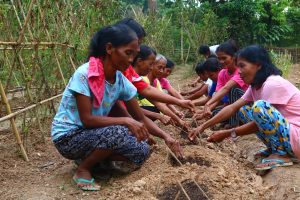Because of its mountainous land-bound area, some barangays in the municipality of Roxas, Palawan have difficulty in accessing food. Considering its distance to the town proper and its rough road, most food such as vegetables, meat, and fish cost higher. This resulted to high malnutrition rate in 2016 based on the Social Welfare Development Indicator (SWDI) conducted, where 63 households from its five barangays such as Dumarao, Iraan, Mendoza, San Isidro, and Sandoval have children weighing below normal (underweight).
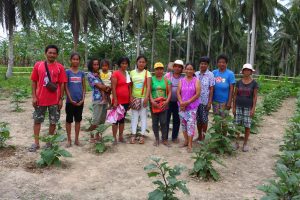 It is with the aim to address malnutrition and food insecurity that the Department of Social Welfare and Development (DSWD) through the Pantawid Pamilyang Pilipino Program enjoins program beneficiaries from this municipality in adopting bio-intensive-gardening (BIG) or Gulayan sa Barangay. But aside from malnutrition, the project has also helped beneficiaries to attend to their low income rate and practice camaraderie
It is with the aim to address malnutrition and food insecurity that the Department of Social Welfare and Development (DSWD) through the Pantawid Pamilyang Pilipino Program enjoins program beneficiaries from this municipality in adopting bio-intensive-gardening (BIG) or Gulayan sa Barangay. But aside from malnutrition, the project has also helped beneficiaries to attend to their low income rate and practice camaraderie
through community organizing.
In Brgy. Dumarao and Brgy. Mendoza, gulayan sa barangay has been strengthened after the conduct of a gardening contest known as the “Gulayan Festival” initiated by the program staff in partnership and support of the barangay local government unit. The contest served as their strategy to encourage households to give 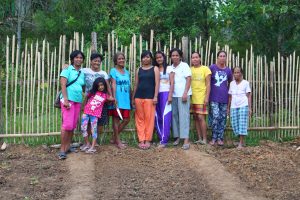 importance to proper nutrition, create successful model of sustainable communal gardens, and increase the level of public consciousness on the health and nutritional dimension as well as economic benefits of the community garden. On November 2016, the gardening contest was announced after their Family Development Session module was discussed with topic on environmental education and information and organic agriculture orientation. It was then that the beneficiaries of the two barangays held their first meeting to establish their Gulayan sa Barangay project. After the FDS, some clusters of the barangay also gather to discuss task assignments of th
importance to proper nutrition, create successful model of sustainable communal gardens, and increase the level of public consciousness on the health and nutritional dimension as well as economic benefits of the community garden. On November 2016, the gardening contest was announced after their Family Development Session module was discussed with topic on environmental education and information and organic agriculture orientation. It was then that the beneficiaries of the two barangays held their first meeting to establish their Gulayan sa Barangay project. After the FDS, some clusters of the barangay also gather to discuss task assignments of th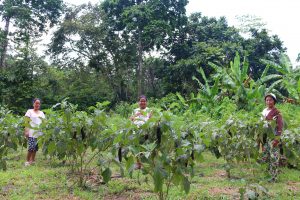 e members and their schedules to take turns in caring for the garden.
e members and their schedules to take turns in caring for the garden.
But before their bountiful yields, most gardens encountered difficulties in rearing their vegetables. Their first challenge was finding an available space for them to start their communal gardens. Some members of the cluster offered their vacant lot as a place to situate their gardens while some borrowed lands from their neighbors. In Sitio Old Site in Brgy. Mendoza, since there was no available area near a water system with a good soil to plant their vegetables, they made their own plot using organic fertilizers and loam soil.
The seeds that they use to plant in their gardens usually comes from the members’ own backyard garden or bought from the market. The Municipal Agricultural Office (MAO) as well as the Department of Agriculture (DA) provide them seedlings when there are available. Vegetables which are usually planted are eggplants, okra, pechay, sili, raddish, string beans, squash, and tomatoes, among others. In order to repel unwanted insects and pests to their crops, most of them use organic pesticides or plant flowers. Through adopting their knowledge from the seminar-workshops of DA, their communal gardens have also flourished.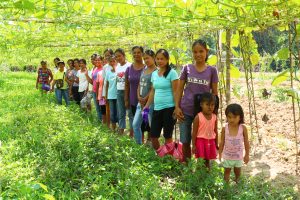
Few months after their establishment, the members have begun seeing their improvements through their communal gardens. After their vegetables grew, the clusters sold their produce to their local neighbors or each of the member for their own consumption. In Sitio Lower Ilian-Ilian in Brgy. Dumarao, some of its members sold their produce in the market since some of them are vegetable vendors. Meanwhile in Sitio Itabiak, also in Brgy. Dumarao, a vegetable supplier buys their yields in wholesale to be sold in the market for retailers. They have been able to generate income from their yields which they saved for future uses of the group. In Sitio Old Site, they were able to bought a female swine for dispersal within their cluster. They get all the expenses of their hog raising in the income of their communal garden as well. Each participating cluster of the Gulayan Festival has gained 3,000 pesos to 10,000 pesos since their first harvest.
On July 2017, winners of the garden in Brgy. Dumarao are Sitio Masaya 1, Sitio Itabiak, and Sitio Lower Ilian-Ilian. Meanwhile, in Brgy. Mendoza, Sitio Old Site, Sitio Proper 2, and Sitio Little Baguio/Taliwara were announced as winners. After the contest, the six sitios from the two barangays continued their communal garden as all members have seen its impact to their selves, their children, and their community. “Ang maganda dito ma’am, hindi na naming kailangan pang bumili ng gulay para sa mga anak namin. Dito alam namin na ligtas yung mga tanim at mura pa. Kahit papaano, kapag walang makain, gulay na lang ang kinakain namin at masustansya pa,” Elvie Sabuya, member of Sitio Proper 2 cluster, said. Because of its lower price compared to those being sold in the market, most households in the community, beneficiaries or non-beneficiaries, turn to their communal garden to buy vegetables.
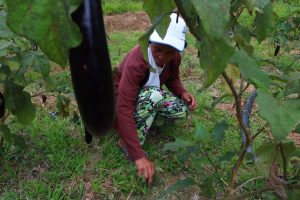
In some clusters, beneficiaries are often seen gambling but after the establishment of the communal garden, they were able to find an activity to keep them busy. More than the money they get, the members said that they can also practice bayanihan which strengthens their sense of camaraderie. “Maganda din po itong gulayan namin kasi mas tumitibay ang relasyon naming miyembro kumpara noong dati na pagkatapos ng FDS ay uuwi na lang. Minsan dito na kami nagpapalipas ng oras para mapawi rin ba ng problema,” said Emmi Delaguna, parent leader of Sitio Proper 2.
Due to its long-term benefits, it was on June 2017 that Ms. Valerie Magallado, their Municipal Link, recommended to the Sustainable Livelihood Program (SLP) that the communal gardens of these sitios become an association to the modality of Seed Capital Fund. With the eagerness of each member to improve their communal gardens, the proposal has been accomplished and submitted and is waiting for approval.
After more than a year of establishment, beyond issues of food access on these two barangays, the Gulayan sa Barangay project has been seen as about building social ties, sharing skills and experience, learning about nature, and taking proactive measures to improve their well-being as well as their economic sustainability. And despite the challenges they encountered, they remained determined to continue their communal gardens hoping that hunger and food insecurity among Pantawid beneficiaries in the area will be eliminated in the long term, in order to reduce the impact of poverty. ###
![]()


